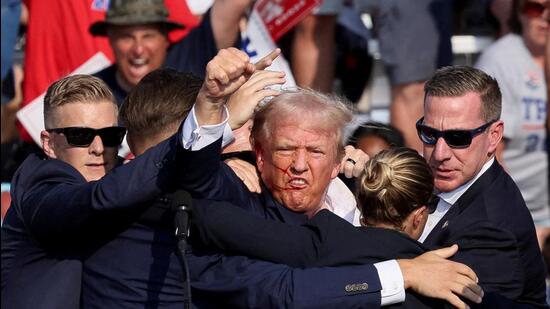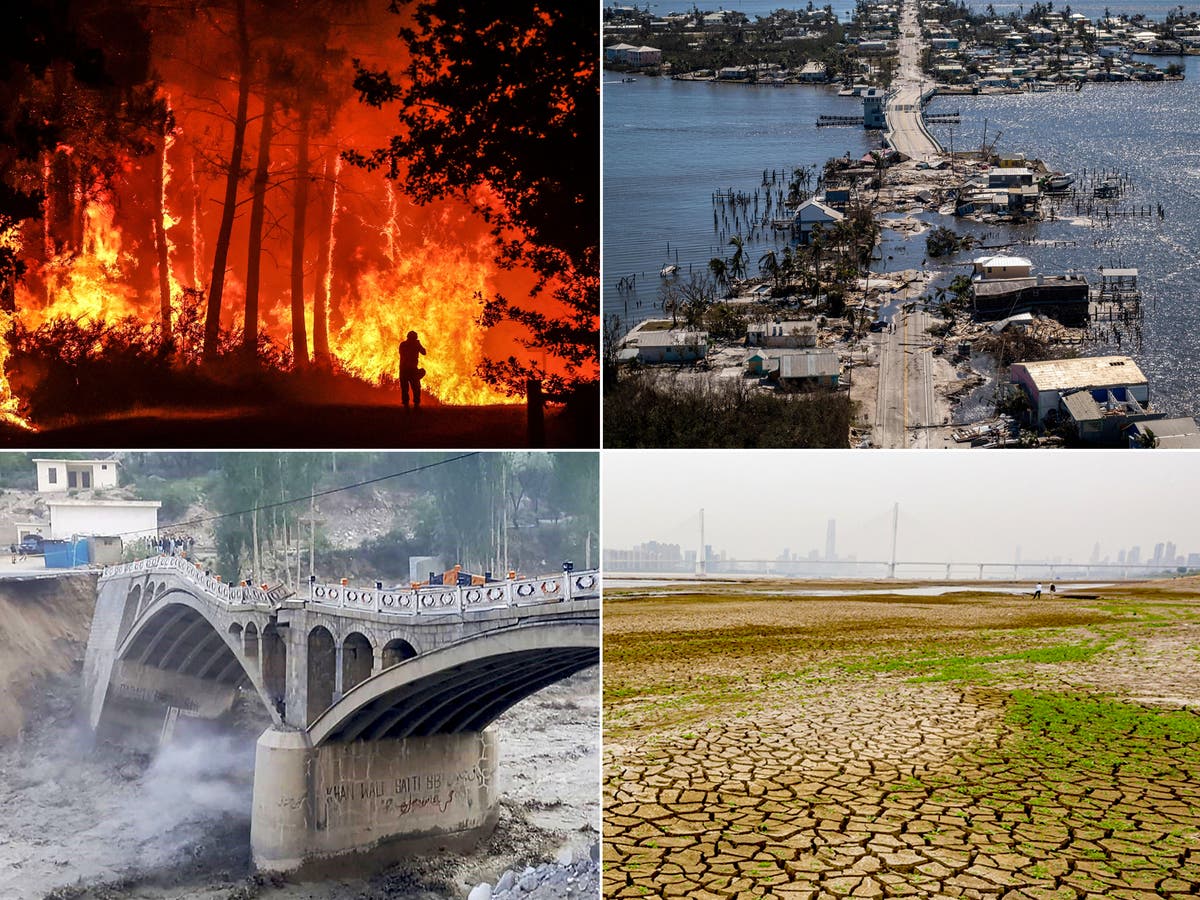From Political Upheavals, Suffering Economy, Tense Geopolitical Relations, And Climate-Related Disasters, How War Was A Solution To Global Recession In The Past, Is The Clock Ticking Faster For History To Repeat Itself?

Do Wars Boost Economy?
With national elections scheduled in over 70 countries this year, nearly half the world’s population will be voting; as a result, 2024 is set to be a critical year for global trade and (geo)political stability and most social and political risk indexes indicate a high-risk, unstable environment worldwide.
History suggests that war often follows economic slowdowns or recessions, and given the current somber geopolitical trends, some economists and analysts believe the world may be inching in this direction.
For instance,
- After the economic deflation of 1797, the U.S. and France were at war from 1798 to 1800.
- The War of 1812 between the U.S. and Great Britain followed the depression of 1807-1808.
- The long depression from 1873-1879 preceded the war between the U.S. and Spain and set the stage for World War I, which lasted until 1918.
- World War II followed the Great Depression of 1929-1939, while the early 1990s recession led to U.S. involvement in the Gulf War against Iraq.
 Hence, historically, wars often follow economic crises, with few instances of recessions occurring after wars. After World War I, the economy experienced a recession from 1918-1921.
Hence, historically, wars often follow economic crises, with few instances of recessions occurring after wars. After World War I, the economy experienced a recession from 1918-1921.
During the Great Depression, U.S. President Herbert Hoover attempted to maintain labor rates at 1929 levels, leading to massive unemployment and economic stagnation, as labor rates did not adjust to levels that would allow production to resume.
The world economy was only revived by the increased war production and mobilization during World War II, which resolved the unemployment problem.
Current conditions resemble those of the 1920s-1930s, with the subprime mortgage crisis pushing the global economy to the brink of depression and conflict. Climate-related disasters have become a factor, making the mix more potent.
 The Present Picture
The Present Picture
The combination of election fever, rising populism, and geopolitical instability will likely make 2024 a challenging year for elections; voting will span more than 70 countries (including seven of the world’s most populous), half of the global population, and around 55% of global GDP.
Following India’s recent elections, countries like Mexico, Austria, Tunisia, Indonesia, and El Salvador will also be voting, potentially allowing populist movements to gain momentum across five continents; this trend, which has been growing over the last decade, may lead to increased social unrest and (geo)political instability.
In a world where the global geopolitical order has been reshaped since the end of World War II, some elections will be especially crucial.
The U.S. elections, in particular, will be a pivotal moment for the global stage and are likely to face attempts at destabilization, as witnessed by the recent assassination attempt on Donald Trump.
The same applies to Taiwan, where the Democratic Progressive Party (DPP) ‘s victory means that tensions with China will remain focused on the island’s status.
Similarly, the outcome of the U.S. elections will be crucial for future relations between the West and mainland China.
These elections are particularly significant as they occur at a time of turbulent international climate marked by intense Sino-American rivalry, Russia’s invasion of Ukraine, and the conflict between Israel and Hamas.
 Political Shifts and Uncertainty
Political Shifts and Uncertainty
The current socio-economic environment is also adding to the hostility toward existing governments, creating uncertainties and volatility for businesses during election periods.
The political uncertainty is heightened by the rise of populism, which has been a consistent trend since at least 2010.
The recent electoral successes of Geert Wilders in the Netherlands and Javier Milei in Argentina highlight this trend, making it even more challenging to predict the direction of government policies.
Social and political vulnerability in Europe is rapidly increasing, with upcoming elections, particularly for the European Parliament, providing fertile ground for anti-European extremist movements.
Additionally, several E.U. members, including Austria, Croatia, Finland, Lithuania, Portugal, Romania, Belgium, and Slovakia, will hold national elections.
Social Unrest Due To High Cost Of Living
Another risk is the potential escalation of social unrest driven by rising prices, eroding trust in politicians, and widespread voter dissatisfaction.
Rising inflation and slowing economic growth have intensified grievances, particularly distrust of institutions, which have been simmering since before the COVID-19 pandemic, especially in Europe.
Hence, The upcoming elections could spark mass demonstrations in various parts of the world.
For instance, 17 African countries might hold elections in 2024, a continent with the highest average social and political vulnerability score and the most significant increase over the past year.
The trend aligns with the political instability many African countries have experienced in recent years, including coups and prolonged conflicts. The recent postponement of presidential elections in Senegal is a prime example.
Likewise, it will also be important to monitor the electoral processes in certain Asian countries, such as Sri Lanka and Pakistan.
 Geopolitical Risks
Geopolitical Risks
With the war between Russia and Ukraine at a stalemate, heightened tensions in the Middle East, and the expansion of BRICS to include five new members, significant changes are accelerating, driven by deep-rooted challenges to Western models and the global order.
In this rough geopolitical arena, the final rounds of some of these elections will be particularly crucial.
For example, The Democratic Progressive Party’s (DPP) recent victory in Taiwan affects not only the 24 million people on the island and the relations across the Formosa Strait but also the entire global geopolitical dynamic.
The Top 10 Global Risks for 2024
The United States vs. Itself
While America’s military and economy remain exceptionally strong, its political system is more dysfunctional than any other advanced industrial democracy, and in 2024, this problem will likely worsen.
The presidential election will deepen the country’s political division, testing American democracy to an extent not seen in 150 years, and undermining U.S. credibility internationally.
With the election outcome uncertain, the only certainty is damage to America’s social fabric, political institutions, and international standing.
Amid global crises, the prospect of a Trump victory is seen as weakening America’s position on the global stage as Republican lawmakers adopt his foreign policy positions and U.S. allies and adversaries hedge against his likely policies.
Middle East on the Brink
The conflict in Gaza is expected to escalate going forward, with several pathways leading to a broader regional war, potentially drawing the U.S. and Iran into the fighting.
This conflict poses significant risks to the global economy, deepening geopolitical divisions and fueling global extremism.
The most direct escalation path would be an attack between Israel and Hezbollah; if Israel preemptively strikes, the U.S. military would support it, and Iran would back Hezbollah, its key regional proxy.
Houthi militants are also escalating, and Shia militias in Iraq and Syria have increased attacks on U.S. bases with Tehran’s approval. While no country involved wants a regional conflict, the risk of escalation is high due to the volatile situation.
 Partitioned Ukraine
Partitioned Ukraine
Russia’s invasion of Ukraine has been a historic failure, strengthening NATO with new members Finland and Sweden and prompting the E.U. to start Ukraine’s membership process.
Russia continues to face extensive sanctions, with more likely to come, and Europe has stopped buying Russian energy; however, most feel that Ukraine will effectively be partitioned this year, with Russia having the battlefield initiative and a material advantage.
If Ukraine does not resolve its manpower issues, increase weapons production, and set a realistic military strategy soon, its territorial losses could become permanent and possibly expand.
Kyiv’s situation is precarious, even though it recently received military aid from the United States and has only slightly better prospects for European assistance.
Hence, still desperate for more troops, Ukraine may take greater military risks, including strikes inside Russia, potentially provoking unprecedented Russian responses and pulling NATO into the conflict.
Ungoverned A.I.
In 2024, technology is likely to outpace A.I. governance as regulatory efforts fall short, tech companies remain largely unrestrained, and more powerful A.I. models and tools spread beyond governmental control.
Axis of Rogues (and America’s Dangerous Friends)
Russia, North Korea, and Iran continue to strengthen each other’s capabilities and act in increasingly coordinated and disruptive ways on the global stage. Meanwhile, even Washington’s allies—leaders of Ukraine, Israel, and potentially Taiwan—could draw the U.S. into unwanted confrontations.
 No China Recovery
No China Recovery
Unless there is an unlikely loosening of President Xi Jinping’s grip on power or a radical shift toward large-scale consumer stimulus and structural reform, China’s economy will underperform throughout 2024.
Beijing’s failure to reform its faltering economic growth model, financial vulnerabilities, and a crisis of public confidence have exposed gaps in the Chinese Communist Party’s leadership and increased the risk of social instability.
The Fight for Critical Minerals
Critical minerals are essential for growth, innovation, and national security in the 21st century across sectors such as clean energy, advanced computing, biotechnology, transportation, and defence.
In 2024, governments worldwide will intensify their use of industrial policies and trade restrictions, disrupting the flow of critical minerals, as China did by imposing a ban and the United States following suit.
No Room for Error
The global inflation shock that began in 2021 will continue to cause economic and political challenges in 2024.
High interest rates due to persistent inflation have slowed global growth, leaving governments with limited ability to stimulate the economy or respond to shocks. This has increased the risk of financial stress, social unrest, and political instability.
 El Niño Is Back
El Niño Is Back
After a four-year absence, a powerful El Niño climate pattern will peak in the first half of this year, bringing extreme weather events that trigger food insecurity, increase water stress, disrupt logistics, spread disease, and foment migration and political instability, especially in countries already weakened by the pandemic and the energy and food price shocks from the Ukraine war.
Risky Business
The U.S. culture wars have infiltrated corporate offices due to pressures from progressive customers, employees, and investors and in response, courts, state legislatures, governors, and activist groups—mostly conservative—will retaliate.
Thus, companies caught in this political and legal crossfire will face increased uncertainty and costs.
U.S.-China Crisis
This year will be rough for U.S.-China relations, particularly over Taiwan and tech competition.
Hence, to put all the risks mentioned in context, let us see what is happening in the world’s major economies.
 Economic Performance of Major Economies in 2024
Economic Performance of Major Economies in 2024
As 2024 unfolds, the economic performance of major global economies is under intense scrutiny, and the interplay of geopolitical risks, rising populism, and ongoing conflicts is shaping their trajectories in significant ways.
United States
The U.S. economy remains strong in terms of military and economic strength, but the political system is increasingly dysfunctional.
The deepening political division, particularly evident in the lead-up to the presidential election, threatens to undermine economic stability and international credibility.
High interest rates, driven by stubborn inflation, are slowing growth and limiting the government’s ability to stimulate the economy or respond to shocks.
This economic drag is compounded by internal political conflicts and external geopolitical pressures, including tensions with China and potential involvements in conflicts triggered by allies such as Ukraine and Israel.
China
China’s economic performance is expected to underwhelm in 2024 unless there is a dramatic shift in policy.
President Xi Jinping’s tight grip on power and the lack of significant structural reforms are hindering economic growth. The failure to redirect towards large-scale consumer stimulus and address financial vulnerabilities is aggravating public confidence issues.
The ongoing slowdown exposes gaps in the Chinese Communist Party’s leadership capabilities, increasing the risk of social instability. Additionally, China’s position in global trade and the critical minerals market is becoming more contentious as international policies shift.
 European Union
European Union
The E.U. is facing complex economic dynamics marked by rising social and political vulnerability.
Inflation continues to exert pressure, slowing economic growth and limiting fiscal flexibility. While Europe has strengthened its geopolitical stance by reducing reliance on Russian energy and supporting Ukraine, these efforts come at a significant economic cost.
The rise of populist movements poses additional risks, potentially disrupting political stability and economic policies.
Hence, the upcoming elections, particularly for the European Parliament, will be crucial in determining the E.U.’s future direction and economic stability.
Russia
Russia’s economy is significantly impacted by the ongoing war in Ukraine and the resultant international sanctions.
Despite facing 11 rounds of sanctions and the freezing of half its sovereign assets, Russia maintains a material advantage on the battlefield; however, the economic toll is substantial, with long-term growth prospects bleak.
The war has isolated Russia economically, leading to a reliance on rogue states such as North Korea and Iran for support; although this alliance boosts Russia’s disruptive capabilities, it does little to alleviate the domestic economic strain.
India
Given our large population and growing influence, India’s economic performance is a crucial factor on the global stage.
While India has shown resilience and growth potential, it faces challenges such as inflation, economic inequality, rising unemployment and the need for structural reforms.
Japan
Japan continues to struggle with low growth and demographic challenges; despite these issues, it remains a critical player in global trade and technology.
The economic policies are focused on sustaining growth through innovation and maintaining geopolitical stability in the face of regional tensions, particularly with China and North Korea.
Hence, Japan’s alliance with Western nations, especially in technology and critical minerals, is crucial for its economic strategy.
Brazil and South Africa (BRICS Expansion)
As part of the expanded BRICS, Brazil and South Africa face unique economic challenges.
Brazil’s economy is influenced by domestic political instability and external pressures from global trade dynamics. At the same time, South Africa contends with significant economic inequality, political corruption, and a need for infrastructure development.
The inclusion of new members in BRICS is a strategic move to counterbalance Western influence, but it remains to be seen how effectively this will translate into economic growth for these countries.
The Last Bit: The major global economies face geopolitical tensions, internal political strife, and economic challenges, and their performance going forward will significantly impact international trade, geopolitical stability, and the broader world order.




